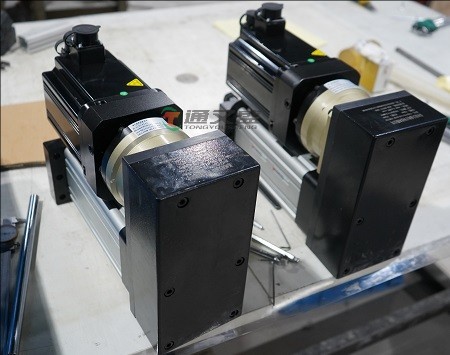In heavy-duty industries such as metallurgy, mining, shipbuilding, and heavy machinery, traditional hydraulic cylinders were once the mainstay. While they can indeed deliver large thrust by transmitting power through fluid pressure, their shortcomings have gradually become apparent with the upgrading of industrial intelligence: oil leakage pollution, complex maintenance, high energy consumption, and difficulty in precisely controlling force and position. These issues are becoming increasingly "out of place" in heavy-duty scenarios that pursue efficiency, green operations, and intelligence.
At this point, the advantages of large-tonnage electric cylinders stand out. They use servo motors to directly drive lead screws or rack-and-pinion mechanisms, converting rotational motion into linear thrust. Not only can they easily achieve thrust output of "tonnage-level" or higher, but they also enable real-time feedback of position and force values via encoders. Combined with control systems for precise output adjustment, they perfectly meet the dual requirements of "force and precision" in heavy-duty scenarios.

In metallurgical rolling mills,
large-tonnage electric cylinders can be used for the screwdown adjustment of work rolls, replacing traditional hydraulic screwdown systems. This enables more precise control of rolling force, improving the consistency of plate thickness. In mining equipment, large-tonnage electric cylinders can serve as lifting actuators for ore buckets or jaw plate adjustment mechanisms for ore crushers, adapting to harsh dusty environments while ensuring operational reliability.
The windlass, steering gear, or hatch opening/closing mechanisms of large ships often require linear motion actuators with large thrust. With their waterproof and dustproof design and high load capacity, large-tonnage electric cylinders can replace hydraulic cylinders, avoiding the risk of oil leakage caused by marine salt spray corrosion. At the same time, they simplify maintenance processes (no need for regular hydraulic oil replacement).
In automotive panel stamping lines or large mold clamping equipment, large-tonnage electric cylinders can be used as auxiliary clamping mechanisms, or directly as the main drive in small presses. Combined with servo control, they implement the process flow of "slow clamping - pressure holding - rapid retraction", improving production efficiency and product consistency.
